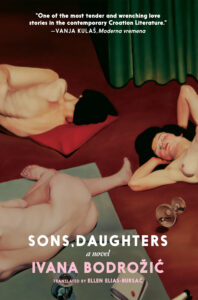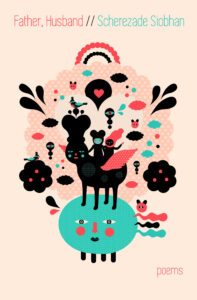Fiction. 256 pgs. Seven Stories Press. April 2024. 9781644213353.
Humans, famously, are social animals, our lives inseparable from a complex web of relationships. But we are also interior beings with rich emotional lives that, try as we might, we struggle to articulate in all their nuance and complexity.
Sons, Daughters, the third novel by Croatian poet and writer Ivana Bodrožić, explores the space between our interior and exterior selves. Each of the novel’s three parts is told from a different perspective, with most of the action unfolding retrospectively, and Bodrožić’s lyrical and ruminative prose, deftly translated by Ellen Elias-Bursać, evokes the tangle of memory and the inexorability of the past. The novel explores the confines of bodies, sex, and gender – and, implicitly, who we are permitted to be.
Lucija, the first narrator, has been hospitalized after a serious accident that left her with “locked-in syndrome,” whereby her entire body apart from her eyes is paralyzed, while she remains conscious. Visited only by her mother, she feels dehumanized and depersonalized among her fellow patients and the gawking of doctors, as if she “were a she-ape in a cage.”
After the accident, Lucija struggles with a sense of disconnect from her body, “melded by the desires and assessments of others, a body neglected and squandered.” Unable to speak, her body has become “the shell in which I live,” cutting her off from the exterior world.
As a child, Lucija always felt misunderstood by her family, who taught her to sublimate anything that made her different: “I am supposed to go where everyone else goes, do what I’m told to do without asking questions, look like other people.” Her mother, too, takes “masochistic pleasure at making life a hell.” Meanwhile, her brother Tomislav, as a boy, has access to an entirely different range of possibilities.
While in the hospital, Lucija agonizes over why her partner Dorian has never visited, prompting her to reflect on their relationship. She recognizes that they “radiated potential that was thwarted from the get-go…Our bodies betrayed us.” Dorian is trans, and the two of them face constant prejudice, both overt and underhand, from strangers, friends, and family. Lucija is engulfed by fear, shame, and guilt, but it is the judgment of her brother Tomislav that weighs heaviest. After learning of her relationship with Dorian, he says: “Fuck her life choices, she’s dead to me.”
~
According to the latest rankings by Rainbow Europe, Croatia was ranked 18th among all European countries in terms of LGBTI equality. Gender transition is fully legal in the country, and Croatia prohibits discrimination based on gender identity, gender expression, or sexual orientation. “Life partnerships” were legalized in 2014.
But public attitudes lag behind. In a 2019 Eurobarometer survey, only 44% of Croatians agreed that lesbian, gay, and bisexual people should have the same rights as heterosexual people – lower than in Hungary or Poland – while only 39% said that a “transgender or transsexual” person should be able to change their documents to match their gender identity.
In a notorious referendum in 2013, 66% of Croatian voters opted to amend the constitution to define marriage as a union between a man and a woman, thereby banning same-sex marriage. Moreover, in the lead-up to Croatia’s ratification of the Istanbul Convention in 2019, right-wing protestors campaigned fiercely against the treaty for its separate treatment of sex and gender.
Within Croatian letters, queer literature is comparatively new, with authors including Gordan Duhaček, Dražen Ilinčić, Darko Lukić, Luka Marić, Dino Pešut, Mima Simić, Vladimir Stojsavljević, Nora Verde, Tomislav Zajec, and Jasna Jasna Žmak. Bodrožić’s novel thus builds on an existing body of work, but queer stories remain relatively rare. Representation of these stories thus matters, but the type of representation may matter even more.
~
Dorian is the second narrator, providing his account of the events before and after Lucija’s accident. As early as he can remember, Dorian knew his body did not match who he was: “With my first awareness of myself came the awareness of wrong growth.” The onset of puberty brings pain and ostracization, and he recounts the painful and onerous journey of his transition.
In Lucija’s telling, Dorian has long been subject to the gaze of others, navigating “the labyrinth of other people’s expectations, moods, and quirks to get by as unremarked on as possible.” In conservative Croatia, Dorian’s existence stirs fear, as if it “signaled their end, and they were prepared to do anything to destroy [him].”
As their relationship evolves, Dorian emerges as a proud activist, while Lucija is haunted by her family, who refuse to acknowledge her relationship. Conversations about Tomislav tilt her into a “black hole,” in which Dorian cannot reach her.
Soon enough, they “can’t hear the music any more.” While out one day with Dorian, Lucija thinks she sees Tomislav, sending her into a spiral of fear. This triggers a fight between the two of them, after which Lucija gets into a car accident. Once learning, days later, that Lucija is in the hospital, Dorian is unable to visit her– first as a non-family member and then by Lucija’s mother. The two are finally driven apart by the collective weight of institutions and family.
~
Bodrožić was born in 1982 in the city of Vukovar, which was nearly leveled in one of the worst battles of the Yugoslav Wars, and she fled the city with her family for the duration of the conflict. After a prolonged siege, Vukovar fell to Serb forces, who cleansed most of the city’s non-Serb population and retained control of the city until 1998, when it was reintegrated into Croatia. Bodrožić’s father, who remained in the city, was killed in the Vukovar massacre.
Considered a “controversial author” in her native Croatia, Bodrožić has written two prior novels, which differ in many ways. The Hotel Tito is a semi-autobiographical novel based on Bodrožić’s displacement as a child refugee in Zagreb and later in Kumrovec (the birthplace of Josip Broz Tito). We Trade Our Night for Someone Else’s Day is a political thriller set in a post-war Vukovar whose inhabitants are still reeling from the violence and aftermath of the war.
However, the unifying thread in all three of Bodrožić’s novels is the experience of those displaced, marginalized, or othered by the violence and patriarchal nationalism spilling out of the 1990s – and, in particular, the experience of women. In Sons, Daughters, this line emerges most subtly in the third and final part.
~
Lucija’s mother resents the life she could have had without her family and “the role I’d been steered toward my whole life.” Abused by her father as a child, she marries young and moves into the house of her husband, who reveals himself to be weak and passive. Her in-laws treat her as a servant: her father-in-law forces her to wash his feet, while her mother-in-law derides her for being useless.
Pregnancy sets in like a curse. As a child, her aunt tells her of the tree from which women in their village – including her own mother – would jump to end an unwanted pregnancy. Her delivery of Tomislav embodies the violence she grows accustomed to, as the doctor operates on her without consent and later brags that he “‘even tightened her up a bit.’” For Lucija’s mother, parenthood means being “blackmailed for the rest of your life.”
She is forced to leave behind her youthful dreams of working as a salesperson. Instead, she finds herself “an old woman at nineteen, good for nothing but plucking chickens.” Her husband is wounded in the war and later takes his own life. Her children having grown increasingly apart, she is at last able to reclaim control over Lucija after the accident.
~
Bodrožić is a skillful storyteller, handily showcased in We Trade Our Night for Someone Else’s Day. But in Sons, Daughters, it is only in the third part that the narrative grows more nuanced, with the moral complexity granted to Lucija’s mother shedding light on her manipulative treatment of Lucija. By contrast, the parts narrated by Lucija and Dorian feel as if Bodrožić is straining to craft a story that is morally unassailable.
Dorian, in particular, is almost one-dimensional, his perseverance through discrimination saintly, and the goal of his storyline seems more edifying than engaging. For example, Lucija cites how trans people “have the largest percentage of suicide attempts” and “make up about one percent of the population and have no social, political or financial clout.” All unquestionably – and outrageously – true. But this recitation of facts does not make for compelling literature.
In an article for Liberties, Becca Rothfeld christened a new genre of contemporary fiction “Sanctimony Literature.” This is a literature “full of self-promotion and the airing of performatively righteous opinions.” Its characters serve primarily as “avatars of identity categories,” rather than singular individuals, and are “tidily bifurcated” into good people and bad people, thus obliviating any moral or personal complexity. Full of good intentions, these novels profess a clear-cut morality that renders them “suspiciously easy to read.”
Bodrožić’s novel is unquestionably well-intentioned (instead of an afterward, she ends the novel with an apology). Yet the moral universe it conceptualizes is overly simplistic. Dorian (as well as Lucija) is good, his one-dimensionality serving as a stand-in for all queer people, while Tomislav is bad, personifying all the prejudices of Croatian nationalism. This is a disservice not only to literature but to queer people themselves, who must conform to this Manichean view of the world. Queer people, too, live lives of complexity and fallibility.
Consider how Dorian describes Lucija’s approach to his transition: “Never a single wrong question, never the slightest rough intrusion, not a single mistaken fascination.” This does not quite ring true – one of the universal experiences of being queer is the inevitability of questions and comments that, however well-intentioned, are misguided, offensive, or othering. It is what being queer, at its base, really means.
Bodrožić’s characters are united in their search for freedom from the limits of bodies, sex, and gender in an unyieldingly patriarchal society. Each in their own way, they are all suffering from a version of locked-in syndrome. But true freedom comes not just in the form of being seen; it also comes in the ability to be a fully actualized human being, with all of the unruliness and complexity that make us so decidedly human.
Sons, Daughters is available through Seven Stories Press. Purchase it now through your local bookstore.
Like what you’re reading?
Get new stories or poetry sent to your inbox. Drop your email below to start >>>
NEW book release
Ghosts Caught on Film by Barrett Bowlin. Order the book of which Dan Chaon calls “a thrilling first collection that marks a beginning for a major talent.”
GET THE BOOK



